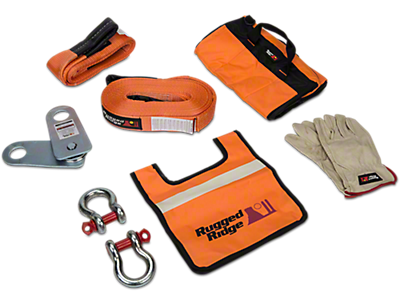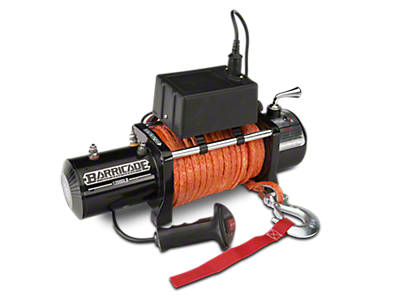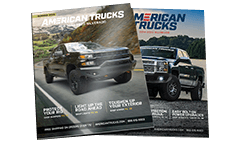Hydraulic vs Electric
Aftermarket winches are either electrically powered or hydraulically powered. The latter is an industrial grade winch, typically running off a power steering pump, and has the advantage of a 100% duty cycle, meaning it can be used essentially endlessly without need to cool down. Of course, with all this power comes a hefty price tag.
Realistically speaking, electric winches dominant the off-road Silverado aftermarket. Whilst electric winches are not as robust as a hydraulic winch and will require cool down periods after - and even possibly during - heavy pulls, they are considerably less expensive than a hydraulic winch and, within the scope of an off-road enthusiast, are more than capable of hauling a GMT800 or GMT900 based Silverado out of the mud.
Motors, Gearsets, and Everything Winch
There are two electric motor designs used in aftermarket winches today – a permanent magnet motor and a series wound motor. Both designs use a rotor and a stator and work on the principle of induced current producing an alternating magnetic field; however, the construction of the stator is different for each type, which results in the different operational characteristics. The rotor is placed inside the stator (stator remains station), connected to the output shaft and is spun as the magnetic fields change.
A permanent magnet motor, as the name implies, uses permanent magnets in the stator. This design results in a lower overall amperage draw. However, permanent magnet winches have a low duty cycle because they are easier to overheat. Furthermore, as the motor generates heat during the pull, pulling power diminishes. On the bright side, permanent magnet powered winches are less expensive than series wound winches. They are good for light and medium duty use as long as they are carefully monitored to prevent overheating.
In comparison, a series wound motor uses field coils in the stator. This produces a heavier electrical draw on the charging system, but the result is an increased duty cycle and consistent pulling power. Of course, while not as prone to overheating, a series wound winch can still overheat and it too should be monitored carefully when winching. The majority of aftermarket winches use this type of electrical motor over a permanent magnet design due to their high and consistent power output.

12,000 lb. Series Wound Motor WInch
Sizing Up your Winch
The size of the motor plays a part in how much power it can produce. Bigger motors will have a higher horsepower rating and consequently draw more electrical charge. More power does not directly equate to a higher winching capacity, but rather it has more effect on the line speed – how fast the winch can reel in the line with a weight attached. Most winches feature motors in the range of 5-6.6 HP.
Winch capacity is better determined by the gear set and the resultant reduction ratio. A winch operates by converting a quick spinning electric motor into a slow turning, high torque output. There are three types of gearboxes, however only really one of them is in prominent use. For the sake of efficiency, we’ll only examine the planetary type (the other two systems are worm gear and spur gear).
Planetary Gear Systems Explained
Planetary gear systems are strong, fairly smooth and are capable of significant gear reduction. They are the prime choice for Silverado winches. The latter aspect, gear reduction, is super critical to overall winch operation. By reducing the input speed from the electric motor, a gear reduction system is able to vastly multiply the amount of output torque, and torque is what we’re after. For example, a fairly common gear reduction for a Silverado winch is in the neighborhood of 150:1. That means for every 150 revolutions of the electric motor, the winch drum will only complete 1 revolution. The higher the reduction ratio, the more weight the winch can pull. The only negative is that line speed is affected by this. A high reduction ratio results in a lower feet per minute line speed. Additionally, planetary gear systems are prone to freewheeling, thereby they require a brake (which can also overheat) in order to prevent slipping in either direction.
Pulling Weight
Horsepower equates to line speed, torque equates to overall winch capacity. It is important to understand that the pulling capacity is based on one layer of line wrapped around the drum (essentially the winch line is fully extended). As the line is reeled in and the layers around the drum grow (increasing drum diameter), pull load decreases because a larger diameter drum changes the effective gear ratio.
Winch Lines
Historically, winches were always equipped with a braided steel cable. Somewhat recently, synthetic rope has entered the fray and is beginning to challenge steel cable as the premier winch line choice.
Braided steel cable is tried and true. We know it is strong for a pretty small diameter and is readily available and inexpensive. It is, however, much heavier than synthetic rope, is more difficult to handle and can have deadly results if it snaps under load (under tension, steel line stores a lot of energy that turns kinetic, meaning it will flail all over the place at extremely high speed if the line snaps). It is also more difficult to repair or splice into another line.
Synthetic rope, on the other hand, is considerably lighter, much easier to handle and repair. On the downside, synthetic rope has a larger diameter for the same rating as a steel cable, meaning it will build up further on the drum (which we know lowers the pulling capacity) for the same line distance. A solution to this problem is rather simple. Being as light as it is, you can keep say 75-100 ft on the drum at all times and a separate 50 ft length in the cab. Joining the two is as easy as tying a proper boy Scout knot and will not detract from the weight rating.

12,000 lb. Synthetic Rope
Mounting a Winch to Your Silverado
From the factory, Chevrolet does not equip any Silverados with a winch mount. This isn’t a big problem as the aftermarket offers plenty of options. If you want to keep the stock front bumper, there are plenty of low profile winch plates available that bolt to the frame rail and do not require removing the front bumper.
Alternatively, there are plenty of aftermarket front bumpers that not only have an integrated winch mount, but typically offer other off-road features such as light mounts, grille guards, D-ring mounts etc. Of course, adding a winch (and possibly an aftermarket bumper) will add some weight to the front of the pickup. Owners of 2011 and later Silverados will be happy to hear that Chevrolet upgraded the suspension and front axle starting in 2011 and thus 2011 and later 4WD Silverados are built to accommodate the weight of a snowplow from the factory. Thus in this instance, a winch and aftermarket bumper are certainly not a problem. Silverados prior to 2010 do not have this distinct advantage but realistically speaking, the additional weight of a winch is not significant enough that it will drastically change the position of the front end.

2" Receiver Winch Plate
The Ideal Winch(man)
The ideal winch for your 2007-2013 GMT800 or 2014-2018 GMT900 Silverado is one that uses a series wound motor, a synthetic rope (with at least 100 ft of length) and has a weight capacity of 1.5 times the gross vehicle weight rating (GVWR). Thus, if the GVWR of your Silverado pickup is 6800 lbs then the minimum capacity winch you should get is one rated at 10,200 lbs (different trim levels and engines change the GVWR, so check the build label of your own Silverado).
With all that said, a combination of a winch, some tow straps, a couple of d-rings and a snatch block should be able to haul your Silverado (or a buddy’s) out of any precarious scenario. And that, my friends, is the pedigree of an elite wingman.

9,500 lb. Winch Kit
Shop All Truck Winches & Accessories
Fitment Includes
- 1999, 2000, 2001, 2002, 2003, 2004, 2005, 2006, 2007, 2008, 2009, 2010, 2011, 2012, 2013, 2014, 2015, 2016, 2017, 2018, 2019, 2020, 2021, 2022, 2023 and 2024 Silverados
- LT Z71, LTZ, Z71, LTZ Z71, WT, Work Truck, XFE, Hybrid, Lingenfelter Reaper, Custom, Special Ops Edition, High Country, LS, LT Silverados
- Engines: 4.3L Vortec V6, 4.8L Vortec V8, 5.3L Vortec V8, 5.3L Flex-Fuel Vortec V8, 6.0L VVT Vortec V8, 6.2L VVT Vortec V8, 4.3L EcoTec3 V6, 5.3L EcoTec3 V8, 6.2L EcoTec3 V8 Silverados
*Please see Silverado parts pages for any exceptions.




